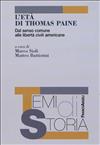This number follows the collection of essays under the same title - Cities and Wilderness on the American Frontiers - published in «Storia urbana», 87 (1999). The first issue analyzed the origins of the word «wilderness» and the many meanings this word assumed during the age in America: from the colonization - with the destruction of the wilderness and the creation of the cities - to the cultural and practical reevaluation of the wilderness and its reappearance into American metropolis. The cities treated in the first number were Shamokin, San Antonio, Cooperstown, Dodge City and Santa Fe. The following essays - written by a balanced group of American and Italian scholars - go deep in this study adding new topics that get lost in the first number, such as: agricultural capitalism, industrialization and deindustrialization, race, environment, politics, and ecology. These arguments are applied to the following cities: Lexington, Concord, Pittsburgh, Birmingham, Knoxville, New York, and Washington.
Reading all together both these numbers will allow the reader to rethink the many aspects beyond the basic concepts of the American way of life. The relation among city, wilderness and frontier appears as a cultural path not linear but circular. The destroyed wilderness comes back in the city as well as the frontier takes a revenge on colonization and the land, abandoned by the settlers, reacquires its original state.






